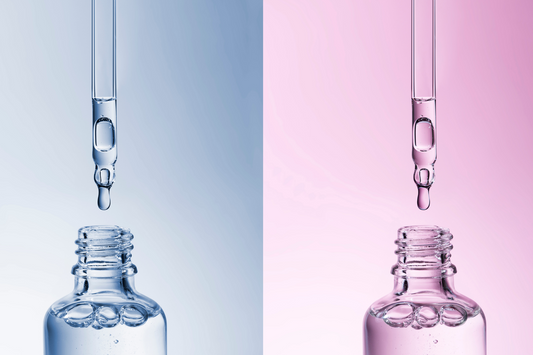Supplements are all the rage these days, and therefore you may have heard a few newer buzzwords emerging that make each product sound revolutionary. We’re used to nutrients and pharmaceuticals, but what are nutraceuticals, exactly? That’s one of the drawbacks to modern medicine and technology: The better it gets, the more complicated it becomes, and the more effort consumers have to put in to sort out the marketing gimmicks from the scientific breakthroughs. We’re here to break down some of the key vocabulary, details, and research behind supplements and nutraceuticals that are aimed at targeting hair loss.
What makes a supplement, a supplement?
For the most part, when talking about supplements, we’re talking about something that’s taken orally, rather than administered topically to the skin. The FDA has strict definitions and guidelines that outline their regulatory authority over each kind of product:
The Federal Food, Drug, and Cosmetic Act defines a dietary ingredient as a vitamin; mineral; herb or other botanical; amino acid; dietary substance for use by man to supplement the diet by increasing the total dietary intake; or a concentrate, metabolite, constituent, extract, or combination of the preceding substances. Unlike drugs, supplements are not intended to treat, diagnose, prevent, or cure diseases [emphasis added]. That means supplements should not make claims, such as “reduces pain” or “treats heart disease.” Claims like these can only legitimately be made for drugs, not dietary supplements.
That seems straightforward enough, right? But remember that the reason most consumers seek supplements is to address larger concerns they have about their health.

Keep that distinction in mind and imagine that you’re sending a letter to a friend. A supplement is like giving them the five digit ZIP code without an address: it may end up in the general area, but there’s no guarantee your letter will be delivered. On the other hand, a drug is like dropping a pin on a map and sending the exact GPS coordinates to them. It’s specific, precise, and targeted, so you can be confident it will reach the intended destination and perform a specific role.
Drugs vs. dietary supplements: A common example
We’re all familiar with the idea that when we’re sick, drinking something like orange juice for extra vitamin C can be helpful. We might’ve even taken those zinc-plus-vitamin C combo tablets at the onset of a cold to try and shorten its duration. Those are supplements, and they contain disclaimers stating that the product isn’t an FDA-approved cold medication.
In contrast, if you come down with a case of strep throat, your doctor might provide you with a prescription for an antibiotic like amoxicillin to fight off the Streptococcus infection. More recently, antiviral drugs like Tamiflu have been approved by the FDA to combat infections of influenza. Unlike the zinc combo tablets, which are supplements, amoxicillin and Tamiflu are drugs, and their claims to treat specific diseases have been subjected to a higher level of scrutiny by the FDA in order to say that they’re treatments. The tests required to back up those claims are often expensive, time-consuming, and challenging.

When it comes to health & wellness products, words matter.
That distinction between a supplement and a drug is really, really important. When it comes to direct-to-consumer (DTC) advertising, the United States is a bit unique: We’re one of only two countries in the world that allows DTC advertising of pharmaceuticals. We’re often overwhelmed with both pharmaceutical and dietary supplement ads, but even if you aren’t aware of it, you can probably tell the difference if you think about it carefully. Pharmaceutical advertisements have lots of text and legal disclaimers because of the stronger claim they’re making about treating a disease.
Commercials for dietary supplements, on the other hand, often allude to addressing a problem that consumers might be concerned with, but use creative language to make the audience feel like their condition will be solved if they buy the product. With some exceptions, dietary supplements often lean heavily on celebrity endorsements and testimonials. This also makes sense, because when advertising a drug, fewer people will have a particular condition and be able to speak to its efficacy. Because dietary supplements make no such claims, however, more people can use them, and more people can then endorse the broader, more general claims they make!
Nutraceuticals: The backstory
Hopefully we’ve clarified a bit of the messy language that’s used in the supplement space—let’s get down to talking about how this relates to hair loss supplements specifically.
One word you’ll often hear in this space? Nutraceutical. The word itself is what’s known as a portmanteau—an obvious combination of two known words to create a new term, one whose meaning is easily inferred from each of the individual parts—and it was coined in 1979 by Dr. Stephen DeFelice to describe “food, or parts of food, that provide medical and health benefits, including the prevention and treatment of disease.” According to his LinkedIn, Dr. DeFelice served as the Chief of Clinical Pharmacology during the Vietnam War at the Walter Reed Army Institute of Research, the largest biomedical research institute operated by the Department of Defense; since then, Dr. DeFelice has moved into operating his Foundation for Innovation in Medicine, a nonprofit advocacy group that pushes for research and laws that advocate for terminology like nutraceutical and doctornaut, as well as consulting for and advising pharmaceutical companies.
That’s a lot of backstory, but we think this type of transparency is important in order for you to draw your own conclusions about how and by whom the nutraceutical space was carved out in the first place. The construction of the nutraceutical term itself is sneaky, as it leans on the scientific-sounding portion of the word taken from pharmaceutical, while benefiting from the common, benign meaning conferred by the part of the word taken from nutrition. However, it’s a word that sounds credible, but is really being used to operate in a legal gray area to avoid stricter FDA regulations. The FDA actually doesn’t recognize the term nutraceutical as having any meaning at all.
This isn’t to say that supplements and nutraceuticals aren’t useful—quite the contrary! We only want to highlight the definitions, regulations, and motivations at play to truly empower you to see the bigger picture.
How nutraceuticals fit into the direct-to-consumer market
Like we mentioned, getting FDA approval for a product intended to target, treat, or cure a certain disease—i.e., a drug—is difficult. It costs money, takes time, and even if the commissioned studies show promising results, they may not hit the required threshold of statistical significance in order to make drug-like claims of being a treatment. That’s why several companies choose to go the route of crafting supplements based on well-known vitamins and ethnobotanicals in order to take advantage of centuries of human experience and familiarity.
Even the most skeptical readers have to admit, that kind of approach makes sense. Why reinvent the wheel each and every time you’re trying to create a new product? Instead of making something revolutionary, small yet meaningful improvements can be made around the edges by studying the effects of well-known molecules and how well they play together when compounded into a complex supplement. The result may not be revolutionary, but that doesn’t mean it isn’t useful.
At the same time, that doesn’t mean that companies are interested in being straightforward with you about that. Advertising is about big, fanciful claims, about exaggeration and hyperbole, as long as it doesn’t cross the line into making false or misleading claims that could lead to scrutiny from the FDA.
Claims about hair loss solutions are designed to pull at our heartstrings
Treating hair loss is something that is no stranger to this type of messaging. Hair loss is something that’s difficult to hide, and because of its causes—age, health, disease, stress—it carries a lot of stigma. For men and women alike, a full head of hair is seen as a sign of youth, energy, and vigor. When our hair starts to thin or our hairline recedes, it feels like we’re losing a fight against factors we can’t control. We might feel embarrassed, less attractive, less confident. No one wants to feel so dissatisfied with their appearance that when they walk away from the mirror and start their day, they dread what the rest of the world might think about them.
In marketing, those are known as pain points, and companies know that the more painful something is to a customer, the more motivated that customer is to do something to change it. Would a guaranteed, affordable drug that completely solves hair loss for each and every customer be ideal? Totally—but we’re still looking for the Fountain of Youth and the Holy Grail, too!
Are dietary supplements and nutraceuticals right for me?
The goal for taking a dietary supplement is to improve your health. When it comes to hair loss, dietary supplements and nutraceuticals can be part of a plan to address a visible problem that’s impacting your self-esteem and confidence. It’s important to make sure, however, that your hair loss is indeed being caused by a dietary deficiency in the first place. Think of it this way: If your car’s broken down, does it really matter whether or not you’ve got a full tank of gas?
If you’re looking to experiment with adding a supplement or nutraceutical product to your daily routine, as always, talk to your doctor first. If you’re concerned about hair loss, it’s possible that a particular medical condition could be the cause—your physician can catch that as part of their diagnosis while ordering a battery of tests to make sure that a nutritional deficiency isn’t contributing to the problem. It’s possible that dietary supplements could become a crucial part of a new prescriptive daily regimen. However, the lack of strict regulation by the FDA, the person-to-person variation in how an ingredient is absorbed and used, and the complex issues they aim to target make the use of broad spectrum nutraceuticals and dietary supplements an unproven universal solution to clear and present problems, as opposed to prescription medications and topical serums.
Date Updated: 05/18/2022





